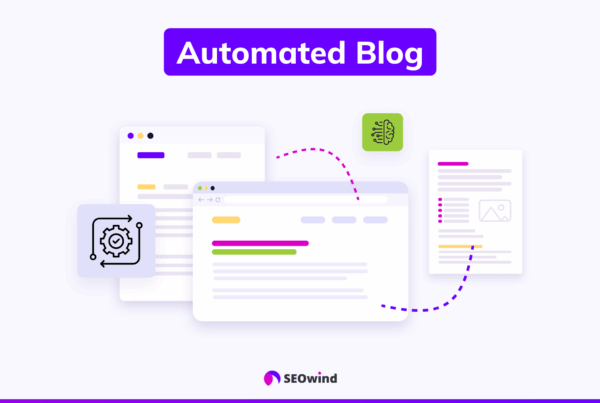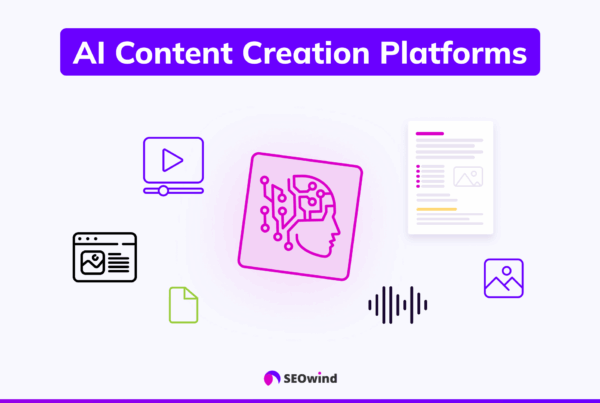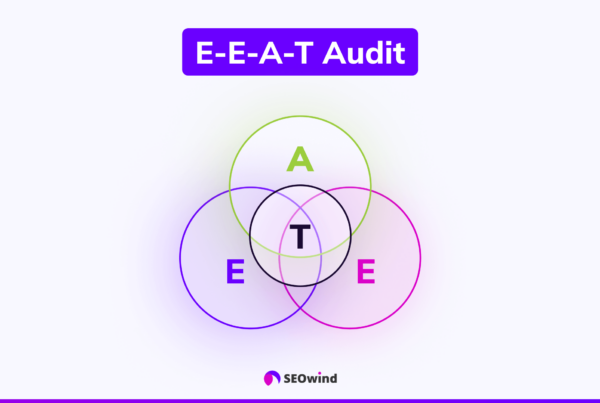Crafting the perfect meta tags is crucial for maximizing your online presence and driving traffic to your website. The good news is that you don’t have to be an expert to achieve this!
In this comprehensive guide on Meta tag generators, we’ll explore the role of meta tag generators in fine-tuning your SEO strategy, making your content captivating and easy to find. So sit back, relax, and let’s delve into the wonders of these revolutionary tools!
What are Meta Tags Generators?
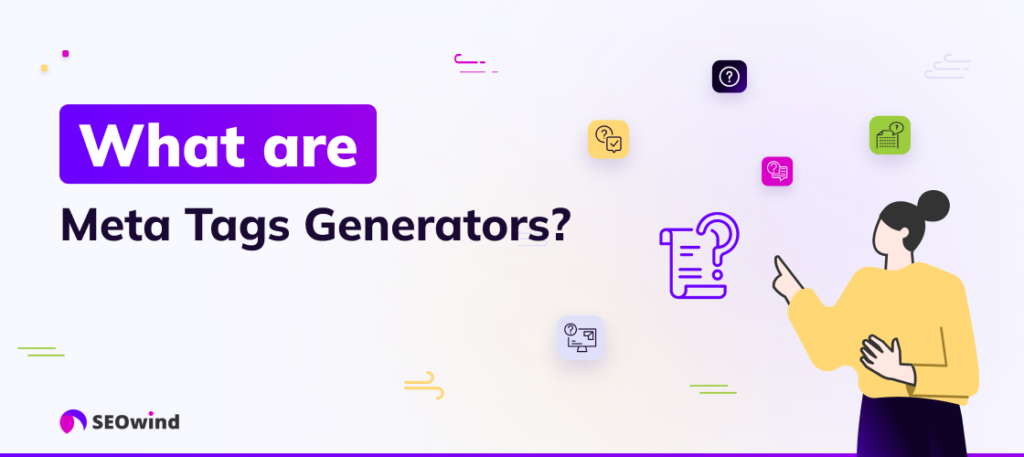
Meta tags generators are AI online tools designed to assist web admins, marketers, and content creators in producing relevant and well-structured metadata for their websites. By using a Meta Tags Generator tools, you can quickly generate essential HTML metadata elements such as:
- Title tag – The text is displayed as a clickable headline in search engine results.
- Description tag – A brief summary of your webpage’s content that appears below the title tag in search results.
- Keyword tag – Though not considered significant nowadays by major search engines like Google, it’s still used by some other smaller search engines.
These advanced utilities also offer additional features, such as generating Open Graph (OG) tags for social media platforms and Twitter Card tags, further enhancing shareability and visibility.
With the ever-increasing importance of Search Engine Optimization (SEO), having access to cutting-edge tools like free meta tags generators makes it easier than ever before for individuals without a technical background to create adequate metadata that resonates with their target audience and improves their page ranking on popular search engine result pages (SERPs).
Benefits of Using a Meta Tag Generator Tool
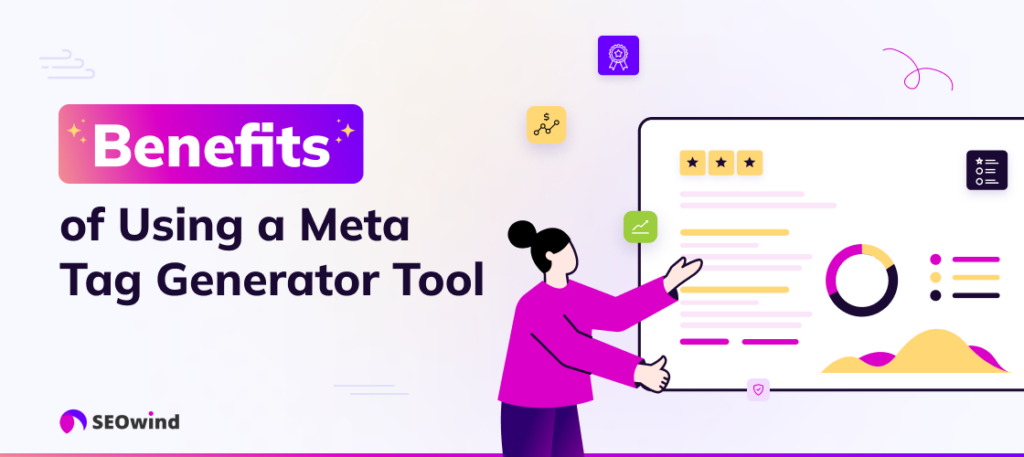
A meta tag generator tool can benefit website owners, SEO specialists, and digital marketers. These advantages stem from the seamless creation and optimization of meta tags essential for improved search engine visibility. Here are some key benefits of using a meta tags generator tool:
Time Efficiency
Creating effective meta tags manually can be time-consuming, especially when managing multiple pages on your site. A free meta tag generator automates this process, allowing you to generate suitable tags within seconds. This efficiency frees up valuable time you can utilize in other critical aspects of your online presence, such as content development or website design.
Optimized Metadata
An outstanding benefit of using an HTML meta tag generator is its ability to create optimized metadata tailored for search engines like Google. The generated tags include targeted keywords specific to your content, enabling search engine crawlers to understand better and index your web pages. This can lead to higher SERP rankings, enhancing your site’s online visibility.
Improved Writing Quality
In addition to saving time and optimizing metadata for search engine optimization (SEO), a blog description generator helps maintain consistency across various sections and pages on your site. They adhere to industry best practices for writing compelling titles and meta descriptions. By leveraging clear language that accurately reflects the purpose of each page, you gain greater confidence in the quality of your metadata.
Customization Options
Using a meta generator tag tool offers automated generation and customization options specific to users’ diverse needs. Based on individual preferences or requirements, these tools allow for simple modifications within suggested metatags — ensuring that generated data caters directly to target audiences while maintaining overall character limits defined by search engines.
Do Meta Tags Help with SEO?

The relationship between meta tags and Search Engine Optimization (SEO) is a contention among digital marketers. While some claim they are essential, others argue that their importance has diminished. Nevertheless, it’s crucial to understand meta tags’ role in SEO and how they can contribute to your website’s performance.
Role of Meta Tags in SEO
Meta tags provide search engines with short descriptions of your web page contents. These HTML snippets offer context for search engine crawlers, leading them to understand and index your content accurately. This process allows users to find what they’re searching for without leaving the search results page entirely.
Some popular meta elements that influence SEO include:
- Meta Title: The headline displayed on the search results page captures users’ attention.
- Meta Description: A brief synopsis under the title, offering additional details about your content.
- Meta Robots Tag: Directs search engines on crawling or indexing specific pages on your website.
Using metatags effectively leads to better visibility among organic searches and optimizes user experience by providing relevant information upfront.
Impact of Meta Tags on Website Ranking
Although not directly affecting SERP rankings, meta tags indirectly contribute to improved page performance through click-through rates (CTRs), traffic generation, and increased user engagement – factors influential in Google’s ranking algorithm.
For instance, an enticing meta title and description in many search engines can drive more clicks from users searching online. In contrast, a robot meta tag ensures that only quality content gets indexed by search engines. Embracing effective keywords within these elements further helps achieve top rankings for targeted terms.
Therefore, integrating optimal meta tags into your website page harnesses higher opportunities for attracting potential visitors organically and driving conversions.
Relevance of Meta Tag Generator Tools for Search Engines
To optimize the impact of meta tags on SEO outcomes effectively, employing a professional tool like a free meta tag generator becomes indispensable. These tools facilitate the creation of accurate and engaging meta tags that adhere to best SEO practices.
With a user-friendly interface, an efficient HTML meta tag generator saves time. It eliminates the guesswork in crafting optimal tags consistent with the latest search engine guidelines. Additionally, SEO tag generators avoid common pitfalls such as keyword stuffing or exceeding character limits.
How to Use a Meta Tag Generator
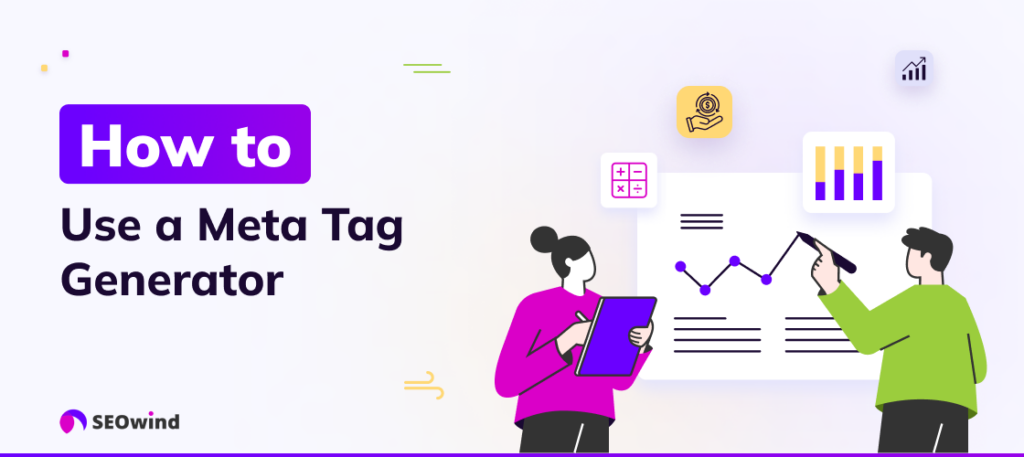
Optimizing a website’s metadata is quintessential for improving its performance in search engine rankings. A meta tag generator can come in handy for creating flawless and effective metatags. This section aims to elucidate the process of generating metatags using such tools, allowing you to enhance your web pages’ visibility quickly.
Find the Right Tool
Select an appropriate meta tag generator tool that caters to your requirements from the numerous online options. Watch for features like user-friendly interfaces, customization abilities, and efficient performance. Some popular choices include free meta tag generators, SEO tags, or HTML meta tag generators.
Provide Necessary Page Information
Once you’ve chosen your preferred meta tag generator, provide the necessary information about your web page to help generate accurate and optimized metadata. This may comprise:
- Page title: A concise representation of the content on your webpage.
- Keywords: Targeted keywords relevant to your content.
- Description: A summary encapsulating the essence of your content.
- Author (optional): The person who authored or maintained the website.
Use specific and compelling language while supplying these details, as they significantly influence how potential visitors perceive your site.
Note: Sometimes you don't need to provide all this data. Based on top-ranking content for a target keyword, SEOwind comes up with a few recommendations how your title or description should look like. This can be a faster and more user-friendly process.
Execute Metatag Generation Process
After feeding in all relevant inputs, initiate the metatag generation process by clicking on a button or option the chosen tool provides. Most tools have an intuitive interface guiding users seamlessly through this operation.
The meta tag generator then swiftly creates pertinent metatags explicitly tailored to optimize search engine results based on the information supplied. It may also offer recommendations from advanced algorithms supplemented by industry best practices.
Adjust Meta tags if needed
The flexibility within these applications enables users to edit provided suggestions, better reflecting desired brand identity while improving overall relevancy throughout site optimization processes.
Incorporate Generated Tags into Your Webpage
Lastly, embed these generated metatags into your website’s HTML code. It would help to place them within <head> and </head> tags at an appropriate position corresponding to each metadata type.
For instance:
- The meta title tag should be placed directly after the opening <head> tag.
- Meta Keywords and meta description tags can follow the title in that order.
- If your chosen generator provided Open Graph tags or other social media-related metatags, ensure their inclusion.
A properly structured HTML head section with generated metadata will boost your site’s search engine visibility and enhance its appeal to potential visitors across various platforms.
Interpret the Results of a Meta Tag Generator Tool
After generating perfect meta tags instantly through one of those practical tools mentioned earlier in this article, let’s discuss crucial aspects to consider when interpreting meta tag generator results:
- Relevance: Ensure generated title tags and descriptions appropriately represent webpage content while strategically incorporating primary target keywords. Remember that these tags should accurately describe your web page’s purpose without feeling forced or stuffed with keywords.
- Length: Check both the title tag and meta description length, as they significantly affect the search engine performance. Aim for a title tag of fewer than 60 characters, while the ideal length of a meta description is around 155 characters.
- Keyword usage: Evaluate suggested keyword lists within provided results, then select those most relevant regarding individualized site optimization techniques, choosing ones that effectively capture searcher intent, driving targeted traffic directly towards desired online destinations.
- Technical aspects: Examine aspects like Open Graph tags, language declarations, robots tags, canonical links, etc., ensuring alignment alongside optimal SEO stratification and maximizing visibility across prominent search engines, including Google, Bing, and countless others prevalent throughout modern digital landscapes.
Armed with knowledge relating specifically toward using meta generators efficiently plus interpreting their supplied outputs effectively, you can now generate perfect metadata, ensuring more robust on-page SEO resulting in improved organic traffic due directly towards increased search engine ranking potential—ultimately realizing sustained success long into future horizons risen amongst fiercely competitive digital environments currently permeating internet spheres worldwide.
3 Best Meta Data Generators

Using meta tags for your every website page or blog is more than just good practice; it’s necessary. To help you generate perfect meta tags instantly, I will introduce you to three of the best meta tag generator tools available. These tools can help elevate your SEO strategy and make your web pages more appealing to search engines and potential visitors.
SEOwind – SEO-optimized Meta Tags Generator
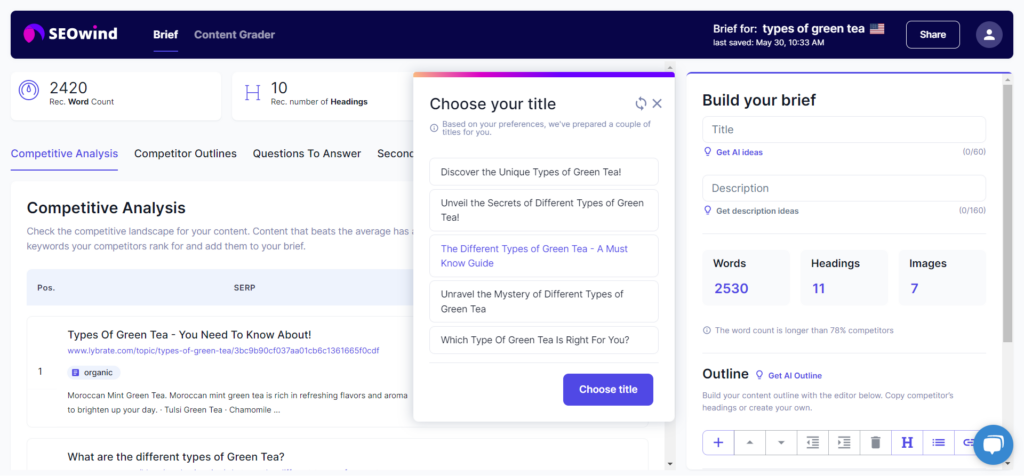
SEOwind is a powerful metatag generator and an all-in-one suite for enhancing your on-page search engine optimization. Some of its prominent features include:
- Meta tag generation: Creating high-quality and relevant meta tags has never been easier with this tool. It enables you to automatically generate multiple variations of your desired title tag and meta description tag. It analyzes top-performing content to make the best suggestions you can choose from.
- Analyzing existing metatags: SEOwind provides an insightful analysis of current tags used on competitive webpages, allowing you to identify improvements and maximize their effectiveness.
- Offering keyword suggestions: The tool helps generate relevant keyword ideas based on top-performing content, ensuring that it appeals to users and search engines alike.
Dashword
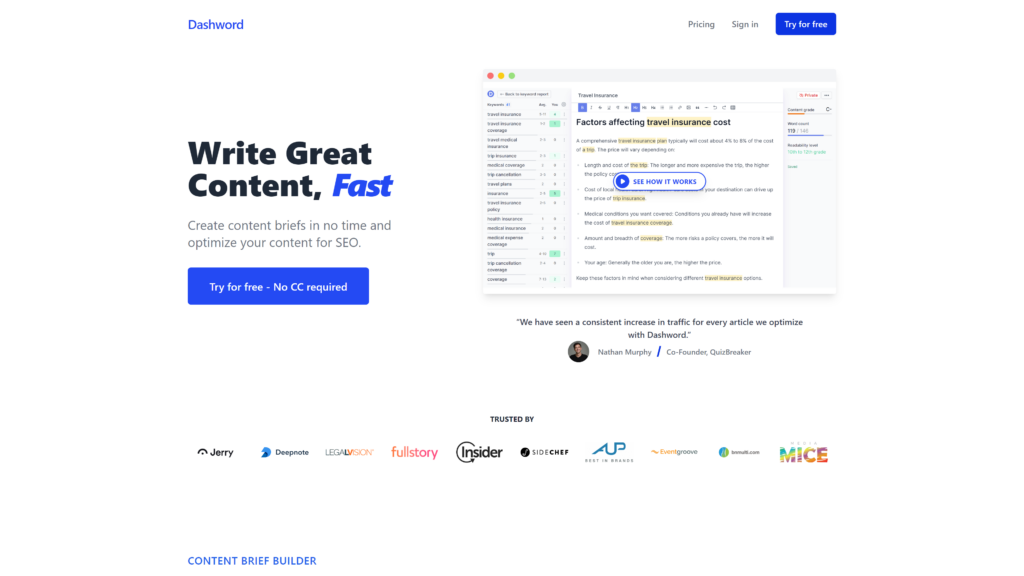
Dashword is another highly recommended metatag generator that offers various advanced features designed specifically for digital marketers and content creators:
- Generating optimized metadata: Obtain tailor-made meta titles and descriptions that are bound to increase user click-through rates significantly.
- Competitive analysis: Dashword conducts thorough research on top-ranking websites within your target niche; utilizing this data helps optimize content based on proven strategies.
To optimize your webpage’s performance further, Daskword offers additional services, such as generating long-tail keywords with high traffic volume and minimal competition.
Copy.ai
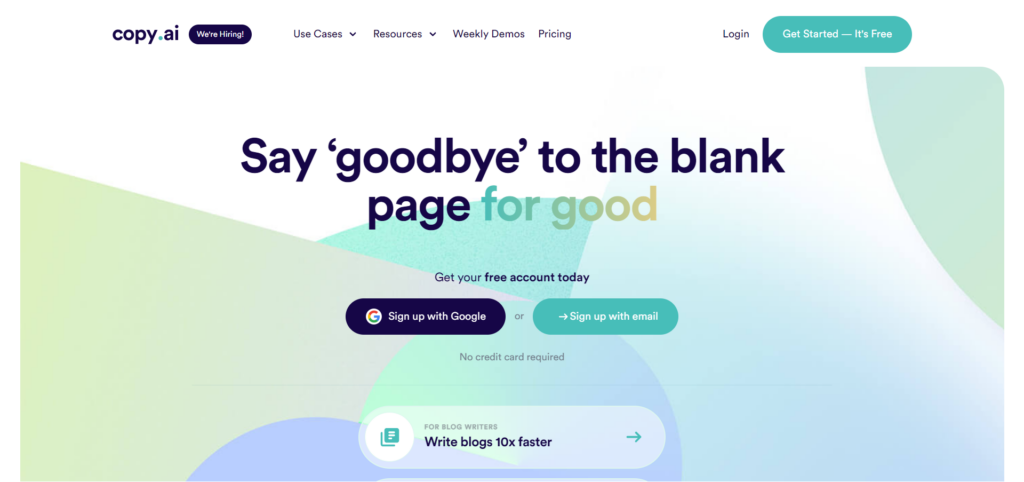
Whether you’re crafting blog posts or fine-tuning website elements such as metadata, look no further than Copy.ai. This innovative platform utilizes a state-of-the-art artificial intelligence system called GPT-3, ensuring your content stands out and ranks higher on search engines. Here are some of the valuable features offered by Copy.ai:
- Meta description generator: Quickly generate eye-catching descriptions for your web pages with the help of Copy.ai‘s specialized AI.
- Creative headlines: Captivate potential visitors with enticing titles generated by their intelligent algorithms.
- SEO-enhanced keyword phrases: Improve site-wide SEO by incorporating recommended keywords to maintain relevance in an increasingly competitive online landscape.
Copy.ai is an excellent solution for optimizing metadata without spending hours manually crafting each element.
Choosing between these top-tier meta tag generators, SEOwind, Dashword, or Copy AI, you can effortlessly elevate your website’s visibility and enhance its performance. Explore each tool before determining which best suits your digital marketing needs and objectives.
Why Choose SEOwind Meta Tag Generator Tool?

Choosing the right meta tag generator tool is essential when optimizing your website for search engines. Our meta tag generator stands out amongst competitors for several reasons. In addition to being user-friendly, it provides an array of features that will help you generate meta tags instantly.
Efficiency and Accuracy
Firstly, our meta tag generator tool offers both efficiency and accuracy. Instead of spending hours creating meta tags manually, which may lead to potential errors, this tool allows you to automate the process. It ensures a high level of accuracy in generating relevant and engaging tags.
Customization and Flexibility
Our meta tag generator’s customization options allow users to create tailor-made tags that best suit their website or blog content. Regardless of your industry or audience demographics, our SEO tags generator has an extensive database that can cater to various requirements.
User-Friendliness
The ease of use is another significant advantage of our HTML meta tag generator. Whether a beginner or an experienced webmaster, the simple yet powerful interface helps you create meta tags seamlessly. The intuitive design reduces learning curves and allows users to focus on enhancing their site’s visibility online.
SEO Optimization Capabilities
It is not enough to add random keywords to the code. Optimization is crucial when using meta tags today. This SEO tag generator helps optimize your webpage’s source code with targeted key phrases required by search engines like Google and Bing efficiently while avoiding keyword stuffing issues that could harm your rankings.

Best Practices for Creating Effective Meta Tags

Keyword Research for Optimal Tag Selection
Adventuring without a map is akin to selecting keywords without research – it might be thrilling, but it’s hardly practical. In-depth keyword research lays down the foundation for successful SEO practices:
- Utilize specialized tools like Google Keyword Planner or Ahrefs to identify industry-specific keywords.
- Analyze competitors’ keywords to understand what words and phrases draw traffic in your niche.
- Prioritize long-tail keywords—those specific phrases potential visitors use when they’re closer to the point of purchase or using voice search.
By tethering your meta tags firmly onto well-researched keywords, you’re effectively guiding more traffic toward your content—the first checkpoint on this quest for higher rankings.
Crafting Unique and Compelling Title Tags
The title tag—often considered an underdog—holds immense sway over viewers’ first impressions. With mere characters at your disposal, ensure each word earns its place:
- Keep it concise; aim for 50-60 characters so as not to be directly cut off by search engines.
- Integrate primary keywords organically near the beginning.
- Balance brand visibility by occasionally including your company name if space permits.
- Convey value proposition crisply; why should someone click through?
Think of your title tag as an elevator pitch whispering secrets of what treasures lie within a click’s reach—create intrigue and relevance in equal measure.
Writing Engaging and Informative Meta-descriptions
Meta descriptions are like snippets from a book blurb, enticing readers with glimpses into storylines while still holding back enough mystery to warrant further exploration:
- Aim for descriptions between 150-160 characters.
- Treat them as calls-to-action (CTAs), encouraging users with compelling language.
- Feature gripping storytelling elements: pain points solved, questions answered, opportunities provided.
Ensure every description offers a slice of engaging narrative that makes passersby stop—and then take action.
Utilizing Relevant Keywords in the Metadata
Weaving relevant keywords into metadata isn’t about cramming them wherever you can – it’s about artful inclusion:
- Infuse title tags, descriptions, and even alt text on images with applicable terms naturally fitting into the informative copy.
- Evade repetition; blend secondary synonyms seamlessly into context, ensuring fluid readability.
- Remember user intent; convey solutions precisely aligned with what users might seek.
A skillfully generated tapestry of metadata adorned with pertinent keywords not only pleases algorithms but also speaks volumes about providing value-led content for seekers who land upon it, searching far and wide across the web’s vast expanses.
Common Mistakes to Avoid with Meta Tags

Navigating the complex world of SEO can feel like taming the wild seas: it’s an art of balance, precision, and knowing when to steer clear of treacherous waters. Within these depths lie meta tags – crucial snippets of text that can make or break your website’s search engine visibility. However, beware! A few common missteps could send your site into the abyss of search results.
Stuffing Keywords and Overdoing Optimization
Once upon a time, digital explorers believed that crowding their meta tags with countless keywords was the secret map to treasure – high rankings on search engines. This practice is known as ‘keyword stuffing.’ In the past, such tactics might have worked. Now, they only lead to penalties from Google’s ever-vigilant sentries.
Consider this advice as you craft your meta tags:
- Strive for natural language in your title tags and meta descriptions – imagine explaining your page content to a friend.
- Use tools like a meta tag builder or SEO tag generator judiciously; they’re aids, not magic wands.
- Prioritize relevance over quantity; it’s about attracting the right audience with fewer but targeted words.
Resist sacrificing readability for density—search engine algorithms have grown brighter as audiences seek genuine connection rather than robotic drivel.
Neglecting to Update or Optimize Meta Tags Regularly
Regular optimization isn’t a mere suggestion. It’s critical maintenance akin to tuning a grand piano before each performance:
- Review analytics regularly to identify underperforming pages.
- Update meta tags using a metatags generator for efficiency, then fine-tune manually for precision.
- Reflect on changes in user behavior trends and update your metadata accordingly.
Remember that regular updates echo the living nature of your website and its audience – a static approach will render even well-crafted strategies obsolete over time.
Most importantly, updating meta tags keeps communication relevant and enticing as seasons change in the market or new products are launched within your brand universe.
